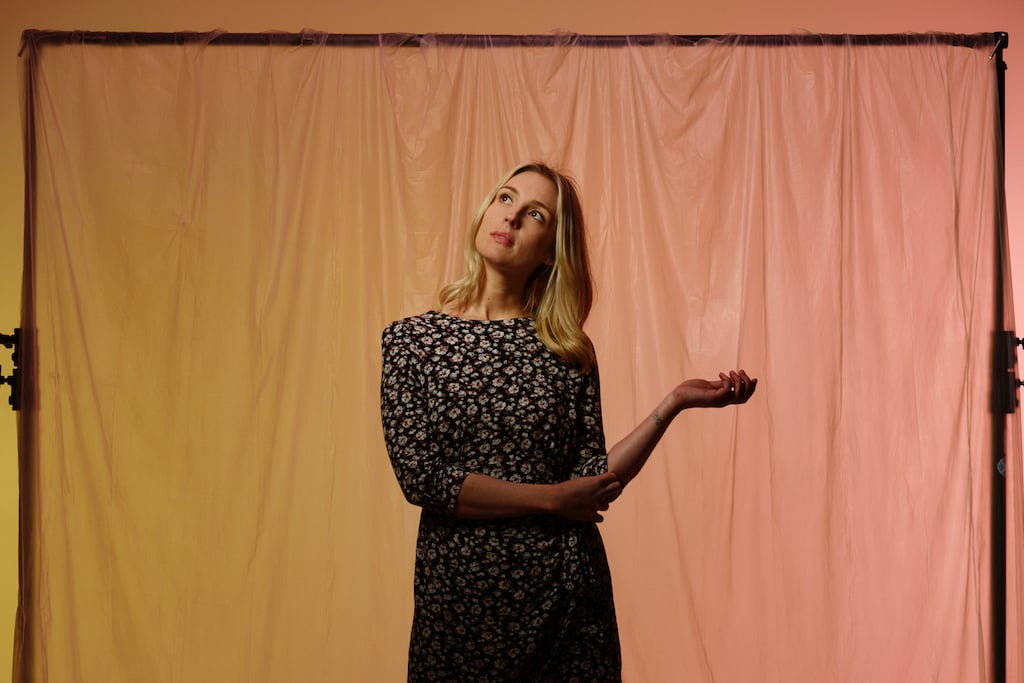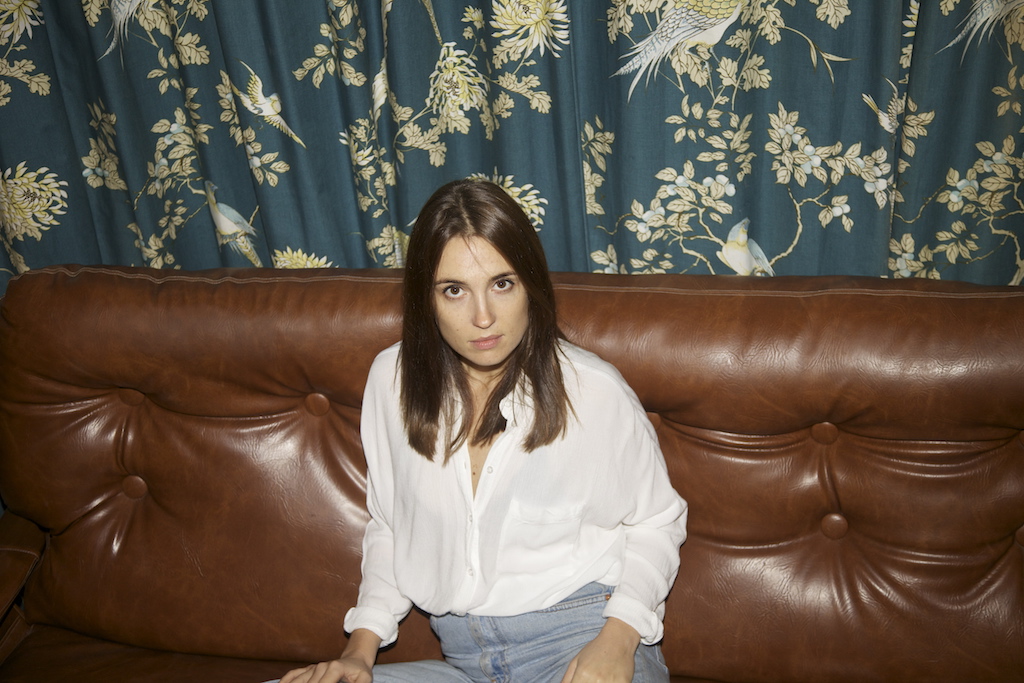“I Thought I Was A Piece Of Shit”: A Brutally Honest (But Optimistic) Chat With Ali Barter
When Ali Barter released her acclaimed debut album, success didn't feel how she imagined. Instead, a lot of hidden emotions came to the surface.

“A lot of the record is about shame,” Ali Barter exhales.
Down the line from a hotel room in India, the Melbourne singer-songwriter is getting real about what went into making her new album Hello, I’m Doing My Best. Much of it keeps coming back to that one, loaded word.
The truth — one she hasn’t really talked about before — is that Ali Barter struggled with alcohol in her younger years. If you paid attention to the interviews she gave around her first record A Suitable Girl, you might have noticed throwaway references to drinking, smoking and hanging out with boys. Today, she’s sober. Back then, it was a problem.
“I don’t drink anymore. But I drank for about 11 years and that was quite a traumatic, confusing time,” she says.
But to get to the point where Barter’s addiction becomes relevant, first we need to backtrack.
Making Peace With The Past
In 2017, Barter released her debut album, cracked the Hottest 100 with her single ‘Girlie Bits’ and began her ascent as one of Australia’s best new artists. What should have felt like an achievement instead became the catalyst for a personal reckoning.
“I was feeling a bit overwhelmed,” she says. “I had some expectations around how I would feel after I put out my first record, and [instead] I felt really bad. I didn’t identify with it for some reason. I rejected it.”
Ali didn’t think she’d make music again. But then memories of the years she was “ashamed” of started bubbling to surface. “That stuff started to come up. It’s never come up before; I’ve never written about it before,” she says. Instead of fighting it, she picked up her guitar and started putting it into song. “Because it was time for it to come out, you know?”
Vignettes of her life before sobriety started splattering out across the songs she was writing and, eventually, formed a new album. So what were those years actually like?
“Just shit,” she answers. “It wasn’t anything major, it was just: I wasn’t playing music. I was in the merry-go-round of bad relationships and bad behaviour and being a victim of everything. I wasn’t doing anything. There’d be really bad nights, and there’d be really dumb things that I did. I knew that [if I didn’t stop drinking] it was only going to get worse, or I was going to have a miserable life… I was very confused, and I felt very alone. ”
“I knew that [if I didn’t stop drinking] it was only going to get worse, or I was going to have a miserable life… I was very confused, and I felt very alone.”
A 12-step program helped her take back her life. For better or worse, music became her anchor.
“When I stopped drinking and got involved in something outside of myself to get sober, the world opened up again for me. I started playing music,” she says. “I was untethered as a drinker and a young person, and then I stopped drinking, and I was like — music — I’m going to put all my energy into that. Which was good and bad, because I had something. I had a purpose then.
“But I put all my daily energy into that, so if it didn’t go the way I expected it to, or I didn’t feel safe and happy like I thought I would when I put out my first record, the wheels fell off. I had nothing else that was propping me up. That was my everything. It made me very unhappy.”
Now, on Hello, I’m Doing My Best, Ali Barter is making peace with her past. Even the album’s title is about reaching a détente with herself.
“I always wanted to be the best. I wanted to feel the best. I wanted to look the best,” she says. “Because I got sober, I was like, ‘now, this is one of my purposes: my purpose is to fucking be amazing, and be perfect’, because I was such a fuck up for so long.”
“But that’s actually not my purpose. My purpose is to show up and do my best, and that’s what these songs are.”
Taking The Sting Out Of Shame
At first impression, the record’s sweet, “sugar punk” sonics feel like something that could have been played from the high school rooftop at the end of 10 Things I Hate About You. Amid all the energy of the music, it would be easy to miss the sly remarks about eating disorders, self harm and Class A drugs.
It’s not all dark — some songs are upbeat odes to Ali’s female friends, her husband, and her late father. But others are frank admissions about the bad times. On ‘Cocktail Bar’, she sings about chasing oblivion and waking up in “all kinds of situations”. Throughout the track’s tight two minutes, she coos “I”m not the girl that I want to be/ Where is the girl that I used to be?”.
“That song’s clearly about my drinking,” she says. “When I was a kid, I grew up in a nice family, I went to a decent school, I was in the choir. I had dreams and aspirations, and then gradually as I got older, all those dreams and aspirations fell away. By the end of that period of my life, I just generally thought I was a bad person. I just thought I was a piece of shit. So that’s what that is about.”
Barter’s honesty — both on the album and in our conversation — feels almost startling. But she says talking about her struggles is part of what got her through them.
“I don’t know how you overcome shame, but I find it really useful when I can share my shame. The problem with shame is we keep it locked inside like a dirty little secret. We think that nobody else has ever felt that way before, or has done that thing, or whatever. Which is not true! Someone’s definitely been through what you’ve been through, and it’s going to be okay.
“I guess I deal with shame through expressing myself, and through talking with my friends and writing songs. I used to do it by eating secretly or getting wasted or smoking cigarettes or bitching about somebody because I felt bad about myself so I had to pull them down. I had all these other coping mechanisms that were really bad, and now I’m just like, I feel shame. That’s all it is. I’m going to call a friend. Maybe I’ll go for a run, and I’m going to write a song about it because this bad feeling has to be for some reason,” she sighs.
“I don’t know how you overcome shame, but I find it really useful when I can share my shame.”
“That’s how you deal with shame: you talk about it. It takes the power away from it. It doesn’t mean that you won’t have shame, or you won’t feel this stuff. But definitely takes the sting out of it.”
So looking back on her two albums and everything she’s experienced so far, can Ali — now 33, sober, wiser, and happily married — say that life gets better as you get older?
“100 billion percent,” she answers.
“I’m not so insecure anymore. I have value in myself outside of the things that I valued in my twenties, and I have deep conversations with people, and I have a tiny bit of experience, which gives me the wisdom to look back and not freak out so much when things happen.
“I’m like, ‘oh, yeah, I lived through that. I’m going to live through this, too.’”
Hello, I’m Doing My Best is out Friday 18 October via Inertia Music.
Ali Barter tours nationally this October/November, beginning with two in-store free performances: one on Wednesday 16 October at Sydney’s Red Eye Records, and one on Friday 18 October at Melbourne’s Rocksteady Records.
Feature image by Kane Hibberd.
Katie Cunningham is a former editor of Junkee, a co-host of the money podcast Frugal Forever, and a freelance writer based in Sydney. She is on Twitter.

